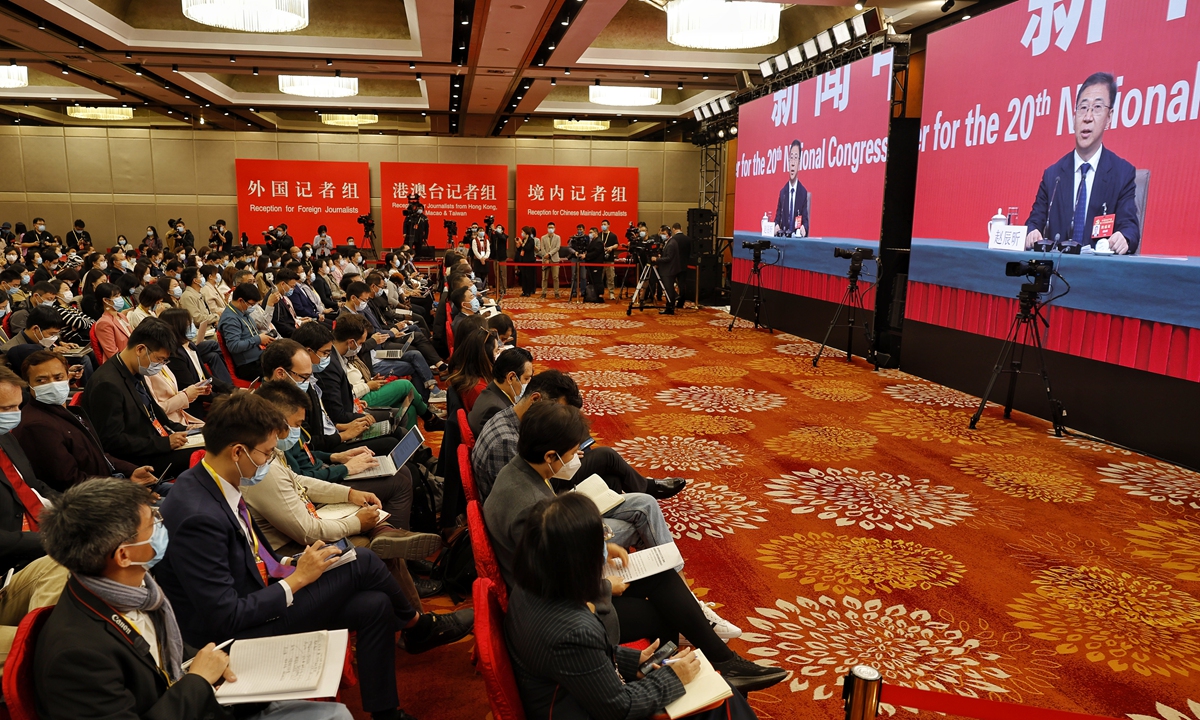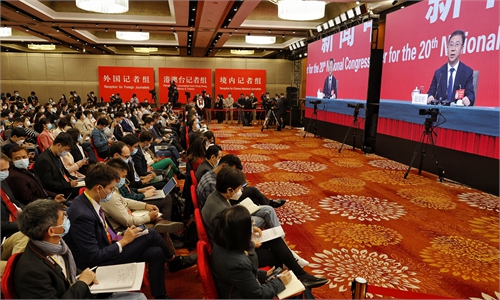China's pace of expanding opening-up will not be disturbed by noise: Global Times editorial

Journalists attend a press conference via video link on the sidelines of the ongoing 20th National Congress of the Communist Party of China in Beijing on October 17, 2022. Photo: Li Hao/GT
At the first press conference of the 20th National Congress of the Communist Party of China (CPC) held on Monday, some foreign reporters asked how the Chinese government will reduce its dependence on foreign imported resources such as iron ore, crude oil, natural gas and soybeans to achieve a more self-sufficient economy. This question sets a trap, intentionally or unintentionally, by presupposing "self-sufficiency" as a goal of the Chinese economy. In the past year or two, this typical misinterpretation of China's construction of a new development pattern has grown like weed in the US and Western public opinion sphere, triggering some unnecessary worries.Zhao Chenxin, a member of the CPC Leadership Group of the National Development and Reform Commission (NDRC) and deputy director of the NDRC, frankly and explicitly responded by saying that it is wrong to think that China will scale back its opening-up efforts or even turn to a "self-sufficiency." He said that General Secretary Xi Jinping stressed repeatedly that building a new development pattern is an open domestic and international dual circulation, not a closed domestic single circulation. He also expounded on China's understanding that economic globalization trend is irreversible and that no country can engage in development behind closed doors. To be honest, these remarks are not new and have been repeatedly emphasized before. But this exactly shows the consistency and continuity of China's attitude on this issue.
The so-called "China's economic self-sufficiency narrative" originated from the US and the West's attempts to portray China as a "closed" and "dangerous" country that wants to break away from the rest of the world, thereby piling pressure on countries that want to expand exchanges with China. This noise and fallacy is not only ideological bias, but also geopolitical scheming. At the same time, it is also full of confusion and self-contradictions: They criticize China for "closing the door," but on the other hand they say that China is engaged in "global expansion"; they claim that China is "taking advantage of the world," but they also smear China's self-reliance as "decoupling" from the world. It all depends on their political calculation on which set of discourse should be used.
Fortunately, facts speak louder than words. Over the past decade, China's status as the world's largest trading nation in goods has been consolidated, becoming the main driving force and engine for the development of global trade. Zhao revealed at the press conference that China utilized 892.74 billion yuan (around $124 billion) of foreign capital in the first eight months of this year, an increase of 16.4 percent year-on-year in comparable terms. Among them, foreign capital in high-tech industries increased by 33.6 percent year-on-year, and the eastern, central and western regions increased by 14.3 percent, 27.6 percent and 43 percent respectively. The industrial structure and regional distribution of foreign investment continued to improve. If these multinational companies are not optimistic about the Chinese market in long term and are not fully confident in China's opening-up, how can they invest in China? Compared with the groundless speculation and suspicion of US and Western public opinion, the facts reflected by these data are obviously more telling.
Opening-up to the outside world is China's basic state policy. This is not a passive choice, but because it is in line with China's fundamental interests, and it is the Chinese people's profound summary of development experience and collective judgment of the general world trend. The key to China's rapid growth from a backward agricultural country to the world's second largest economy lies in its reform and opening-up. Reform and opening-up improve and interact positively with each other. China's advancement toward building a modern socialist country in all respects will also rely on reform and opening-up. A strong consensus or even a belief has been formed in Chinese society. China's determination and will to open up will not be shaken. It will only continue to be promoted to a wider, deeper and higher level, which will also bring more development opportunities and dividends to the world.
China's economy has long deeply integrated into the world economy. China's development cannot be separated from the world and the world's prosperity also needs China. The report to the 20th National Congress of the CPC said that China will promote high-standard opening up and accelerate efforts to foster a new pattern of development with domestic circulation as the mainstay and domestic and international circulations reinforcing each other. This is not difficult to understand. Given China's huge economic scale, domestic circulation as the mainstay is a natural result that accords to laws. In addition, it is followed by "domestic and international circulations reinforcing each other." Also, China's economy has always stressed "self-reliance," which is fundamentally different from closed "self-sufficiency." Some people are deliberately confusing the facts.
In today's world, there are indeed some people in the US and the West who want to reverse the course of history, going against the trend of economic globalization. But such words and deeds will not be accepted in Chinese society, and are not welcomed in the international community. There are also people who measure other people's corn by their own bushel, making noise in the world. Due to their poor and outdated cognitive level, they really cannot keep up with the step forward of the world, and cannot understand the broad-mindedness of China-proposed building as community with shared future for mankind. They are bound to be left far behind the general trend of the times.


